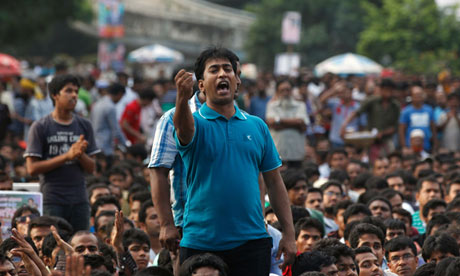Fears mount that the eighth most populous country in the world will be plunged into chaos in runup to poll later this year.

Fears are mounting in Bangladesh that violence and protests could derail elections later this year, though senior government officials are adamant that the polls will be free and fair.
Following street clashes last month and with oppositions parties planning a campaign of protests that will build in intensity through the summer, many are concerned that Bangladesh, the eighth most populous country in the world, will be plunged into chaos in the runup to the poll.
Violence and strikes six years ago led to polls being postponed and eventually the declaration of a state of emergency and a military-backed caretaker government. A controversial tribunal investigating alleged war crimes dating back 42 years has polarised an already-partisan political scene. More than 70 died after it delivered its judgments in February.
Coming after the collapse of a factory producing clothes for the west with the loss of 1,130 lives in April, any political crisis would be expected to seriously damage Bangladesh’s booming garment trade, which accounts for 80% of its exports, and would complicate efforts to improve conditions for the 3.5 million employed in the sector.
Gowher Rizvi, chief representative of the prime minister, Sheik Hasina, told the Guardian that preparations for the forthcoming elections, were “completely on track” and that the tribunal, probing crimes committed during the 1971 war in which Bangladesh broke away from Pakistan, was about bringing justice previously denied by “the twists and turns” of the country’s history. A coalition led by Hasina’s Awami League has been in power since a landslide victory in 2008.
“The government remains committed to elections. Barring some disaster outside its control, elections will be held on time and as per the constitution,” Rizvi said.
However, many issues remain unresolved, particularly the demand from the main opposition party, the Bangladesh National party (BNP) for the Awami League to hand over power to a caretaker government. Sheikh Hasina, daughter of independence leader Sheikh Mujibur Rahman, who was assassinated in 1975, insists she will lead the government into the polls herself.
Rizvi, her representative, said that all executive authority would be handed over to the country’s election commission, and that “whatever it takes for free and fair elections” would be done.
This is unlikely to be enough for Khaleda Zia, the leader of the BNP and the widow of General Zia-ur Rehman who took power in 1977 and ruled until he too was assassinated in 1981.
A BNP official told the Guardian that party strategists believed Hasina and the Awami League aimed to force the BNP to boycott the poll, allowing them to keep power in a “one-party election”.
“Incumbents always lose in Bangladesh. The government know they will lose this [election] and are ready to do anything to hold on to power,” he said.
The BNP plans to ramp up street protests between the end of student examinations next week and the beginning of Ramadan, the Muslim holy month, in July. This will give both sides an idea of what kind of muscle the party can deploy. Then the real battle can begin in the autumn.
Three elements are key: the role of Bangladesh’s Islamist parties, the ongoing war crimes tribunal and the potential mobilisation of young voters alienated by the partisan politics of recent years. All three are interlinked.
Jamaat-e-Islami (JI), the main Islamist party and a long-term ally of the BNP, won only two seats in the 2008 elections. However, their voters can swing the result in dozens of crucial constituencies decided by wafer-thin margins.
The defendants in the so-called International War Crimes Tribunal are largely JI leaders, prompting charges that it is politically motivated. The government denies this.
Alongside JI, there is now a new force called Hefezat-e-Islam. Shah Ahmedullah Ashrafi, its deputy emir, told the Guardian that the movement had been founded in 2011 to protect Islam from the corroding influence of democracy, socialism and secularism.
In a madrasa on the banks of a branch of the heavily-polluted Buriganga river, on the edge of one of the largest slums in Asia, Ashrafi, 73, explained that Bangladesh was a Muslim nation but had been turned into a “country of Bengalis”.
“The problem is the unbeliever … He has no principles,” he said.
Hefezat-e-Islam organised massive demonstrations last month that ended in police killing an undetermined number of protesters and say they will take to the streets again to enforce their demands. A particular grievance is alleged government support for bloggers associated with the Shahbagmovement whom the Islamists accuse of being atheists who have insulted the Prophet Muhammad.
The Shahbag movement, named after a traffic intersection in the centre of Dhaka, saw hundreds of thousands of young people demonstrate earlier this year to demand death sentences for those found guilty by the tribunal.
But though, in interviews with the Guardian, young activists focused their anger on Jamaat-e-Islami, which they called “the terrorist group”, a series of more inchoate discontents underpinned the movement too.
“Do they want an all-encompassing democratic revolution? No. Do they want liberal democratic governance within the existing political order? Yes,” said Nurul Kabir, the editor of the New Age newspaper. As elsewhere in Asia, a new generation of politically conscious, urban youth are challenging established politics of patronage and demanding better, more responsive governance.
Imran, a 29-year-old doctor who effectively sparked the Shahbag movement with a Facebook post and who is now in hiding, said they would also soon launch a campaign of protests.
Abdur Razzaq, assistant secretary general of Jamaat-e-Islami, said: “Everyone has the right to come to the street and mobilise peaceful demonstrations.”
It seems there is only one thing on which all are agreed: the struggle, when it comes, will be won or lost on the streets.
Source: The Guardian









